By Rocio Granados - La Voz Catolica
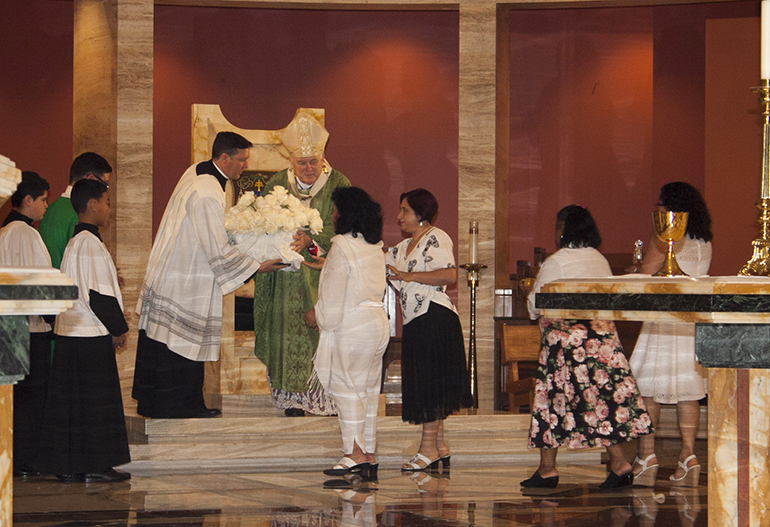
Photographer: ROCIO GRANADOS | LVC
Representatives of Women Working Together USA take up a basket of white flowers as part of the offertory. The flowers bore a ribbon with the names of loved ones who have died or could not be present at the Mass in honor of domestic workers, most of whom are women and immigrants.
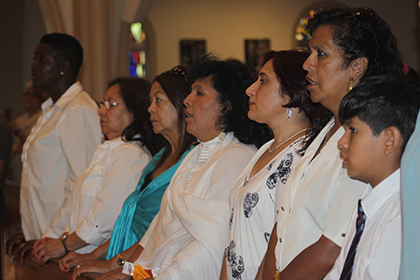
Photographer: ROCIO GRANADOS | LVC
Members of Women Working Together USA take part in the Mass celebrated by Archbishop Thomas Wenski in honor of domestic workers.
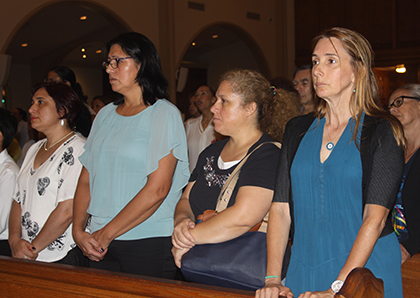
Photographer: ROCIO GRANADOS | LVC
Representatives of pro-labor organizations Women Working Together USA, the Miami Workers Center, and United We Dream took part in the Mass celebrated by Archbishop Thomas Wenski in honor of domestic workers. From left: Rosana Araujo, Viviana Avalo, Mery Ponce and María Asunción Bilbao.
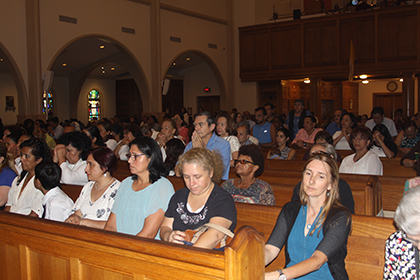
Photographer: ROCIO GRANADOS | LVC
Dozens of domestic workers, along with representatives of labor groups working on their behalf, attended the Mass celebrated by Archbishop Thomas Wenski in their honor.
MIAMI | Since arriving from her native Argentina 17 years ago, Viviana Avalo has worked as a cleaning lady. She began by charging $40 per house, and slowly built up a clientele of as many as 13 houses.
But the job often required her to endure debasing treatment and abuse, overwork, and low wages, with no benefits, paid vacations or sick days.
At first, she took it on to help her husband sustain their household and four children. She stuck with it because it’s a type of work where “you don’t need papers, just to be honest and work well,” said Avalo, one of many domestic workers who attended a Mass in their honor June 25 at St. Mary Cathedral.
The Mass was celebrated by Archbishop Thomas Wenski, who called them in his homily “the least favored of society.”
The archbishop noted that most domestic workers are women and immigrants who must accept meager pay to sustain their families. Yet their work entails great responsibility, for they “provide invaluable help” to other families by looking after their children, their elderly, their sick and disabled.
At the conclusion of the Mass, he expressed the Church’s appreciation for domestic workers’ contributions to society and asked that “with the help of God their dignity will be respected and they will be able to overcome the conditions of exploitation in which many find themselves.”
The Mass represented “a union being forged by women of faith to gain our rights,” said Jaqueline López of Women Working Together USA, which along with the Miami Workers Center is part of the National Domestic Workers Alliance.
Domestic work � which includes cleaning, cooking, caring for children and the elderly � is considered informal work, with no written contracts or work guarantees. Those who do this work often face difficult situations.
No labor laws
López said domestic workers “are generally the most beaten down group. Our work is not recognized. We don’t have decent schedules, there’s a lot of sexual harassment, and we have no way of documenting those abuses. There is no law regarding domestic workers.”
In 1935, Congress passed the National Labor Relations Act to protect the rights of U.S. workers, but the act exempted domestic and agricultural workers. Historically, domestic work had been done by slaves, then freed blacks, and now the workers are mostly immigrants, many of them undocumented.
“It’s work that many of us do when we arrive as immigrants,” said June Baret, a native of Jamaica who takes care of the elderly. “It’s not a question of race. Some persons do this work to support themselves, others, like me, love their work. I love to care for the elderly.”
“People are always going to reach old age and need someone to care for them,” Baret added. “They will always need someone to cook, someone to care for their children. Our work allows you to go and do your job.”
López stressed that, for many people, “we don’t exist. Nobody knows what a domestic worker is. It’s like a piece of furniture. For us, it’s very important that people know that we do important work that allows other people to go to work in peace. We are cleaning their homes and taking care of their children.”
“Without the work of domestic workers, no other job would be possible,” said Karla de Anda of the Miami Workers Center.
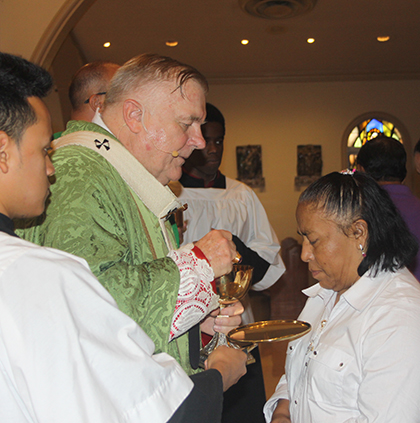
Photographer: ROCIO GRANADOS | LVC
Guadalupe Hernández, a domestic worker, receives Communion from Archbishop Thomas Wenski during the Mass recognizing their important work, June 25 at St. Mary Cathedral.
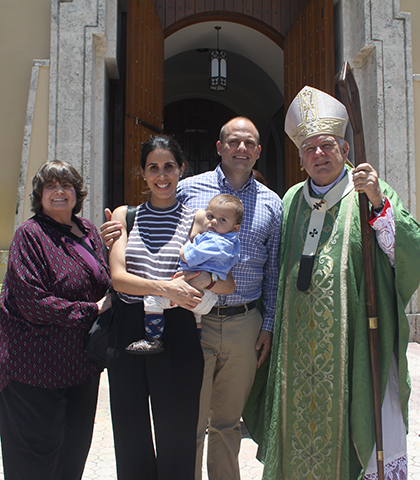
Photographer: ROCIO GRANADOS | LVC
State Sen. José Javier Rodríguez, who is trying to pass a "bill of rights" for domestic workers in Florida, poses with Archbishop Thomas Wenski outside St. Mary Cathedral after the Mass. With him are his wife Sonia, his son Javier, and his mother Joyce.
Cultural education
In today’s society, working mothers seek out other women to care for their children. At the same time, those children receive a cultural education from the domestic worker.
“We have to train these nannies, because now they are not mere maids, they are part and parcel of the chain of education and transmission of values,” said Samuel Díaz, a local Catholic, referring to the Instituto Pedro Arrupe in Miami. The Jesuit-run institute is offering educational programs for domestic workers in conjunction with the organizations seeking greater rights on their behalf.
López founded Women Working Together two years ago, along with Rosana Araujo. Their goal is to educate the women who are domestic workers so they can solve their problems and fight for their rights.
“We talk about defending our rights but we don’t know, what are the abuses? How do we defend ourselves? How do we take care of ourselves at work (such as by properly using cleaning materials)?” Araujo said.
In 2011, the International Labor Organization, a United Nations agency, issued a Convention on Domestic Workers calling on countries to guarantee them the same rights as every other worker, such as daily and weekly rest periods, set work hours, the right to overtime and paid annual vacations, as well as adequate protection from violence. The ILO designated June 16 as the International Day for Domestic Workers. To date, 22 nations have ratified this Convention, but the U.S. is not among them.
States such as New York, Hawaii, Illinois and California have approved a “bill of rights” to protect domestic workers. Last year, Miami-Dade County designated June 7 as the Day of Domestic Workers.
These efforts have succeeded in bringing visibility to the issue.
“We continue to fight for the rights of these workers, who are excluded from any labor laws. We want a strong ordinance against wage theft, and we also want steps taken to prevent human trafficking,” said de Anda.
State Sen. José Javier Rodríguez of Miami, who also attended the Mass, said “it’s important to be in solidarity when we are talking about a just cause, but also when we are talking about exploitation.”
“Be not afraid. We are with you,” he added, noting that he will continue to try to get a bill of rights for domestic workers passed in Florida.
FIND OUT MORE
- According to the Miami Workers Center, there are more than 10 million domestic workers worldwide, including nearly 100,000 in South Florida; 90 percent of them are women and 70 percent hail from Latin America and the Caribbean islands.
- The data also indicate that most women emigrate primarily to flee domestic violence, and secondarily to give their children a chance at a better life. Many of these women are heads of household and the sole support of the families they left behind, which is why they endure all types of abuse � and the current immigration situation makes them even more fearful of reporting it.
- They also are victims of human trafficking, when labor contractors or smugglers take away their passports and abuse them. “It’s a terrible slavery. They are treated worse than animals,” said Karla de Anda of the Miami Workers Center. “In many cases they are made to sleep in closets or laundry rooms or next to the garbage, and their phone calls and outings are restricted.”
- Currently, five of those types of cases are being processed and eight more have gotten underway, but many times women have retracted their complaints for fear of reprisals, de Anda said.
- Her organization undertakes campaigns to raise consciousness among the domestic workers, many of whom don’t view themselves as victims of human trafficking. Neither does society. In many cases, their employers don’t know that taking away their legal papers is a federal crime.
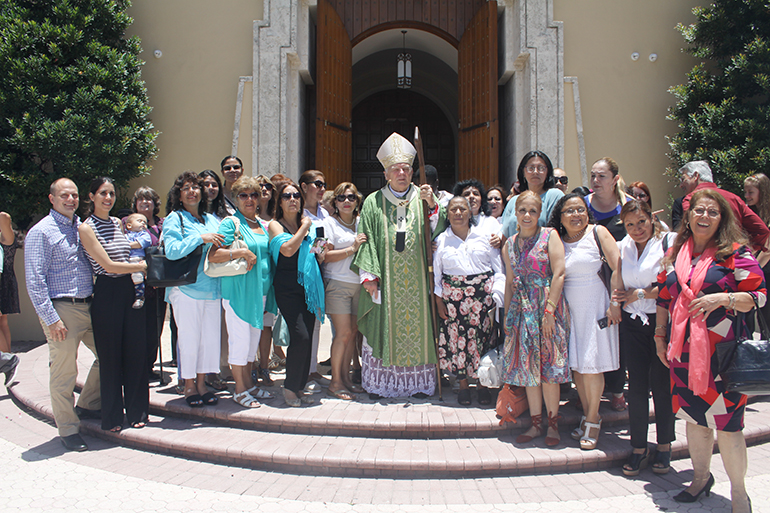
Photographer: ROCIO GRANADOS | LVC
Domestic workers and labor representatives pose with Archbishop Thomas Wenski after the Mass celebrated June 25 at St. Mary Cathedral to recognize domestic workers in Miami-Dade County.


Comments from readers